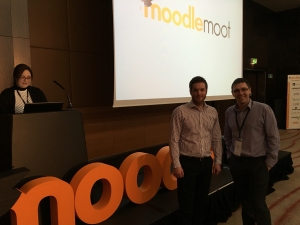London’s Park Plaza Hotel recently played host to the annual Moodlemoot for Ireland and the U.K. People descended from around the world for the Moodle convention on the Thames in the capital. Over 350 people attended from all walks of life, including course creators, administrators, developers and business decision-makers. Whilst the majority of the audience were from the further education and higher education sectors, 25% of people came from the corporate sector.
Moodle is the world’s largest open-source learning platform, and a new release is imminent – Moodle 3.1 will be released soon, and the priorities for the Moodle development roadmap include:
- New default theme with no blocks and Bootstrap 4
- Activity module overhauls
- Easier integrations
- Strong mobile support
Moodle tips
Matt Porritt MD of Catalyst, Melbourne, Australia.
- Always upgrade your Moodle. Every version of Moodle gets better.
- Challenge your staff and ask if you can see the latest Moodle backups.
- There is a Moodle plugin for just about anything so this is worth searching for.
- You can turn off some of the advanced functions of Moodle to make the user experience easier to use.
- LMS analytics is becoming a big thing, providing you have enough Moodle data to poll. Analytics can be used to generate management information for student interventions and to inform which courses are working and therefore how to enhance your learning design.
Moodle has three main influencers for the product roadmap. A lot of resources in Moodle HQ have been placed in Moodle for Mobile and there are some huge benefits for Moodle here as lots of the Moodle modules work in offline mode. Moodle mobile apps can be branded for institutions that want them and then rapidly deployed to the Apple App Store and to Google Play.
Moodle in universities
The Open University’s Jenny Gray reflected on 10 years of Moodle at the OU. Moodle is still the learning platform of choice for them and has recently been chosen again by the OU based on student experience. The OU is now on their 3rd redesign of Moodle to allow for greater personalisation and flexible learning pathways. Furthermore, they have included streamlined tools in Moodle for better student support.
Jenny described some of the priorities as being critical feedback, showcasing work and comments. The OU has 20 developers plus business analysts and associated project managers managing their Moodle platform. They release Moodle updates on a quarterly basis. The OU’s Moodle averages 30k visits per day and they have over 100,000 users on their platform.
So what next for the OU? They’re focussed mostly on a quicker route to going live for content. They are also looking at improving their collaborative learning tools alongside their media player.
The OU’s wish list includes:
- Better search
- Single student profiles
- In page discussions
- Learning analytics
- Progress indicators
- Student archive
The pace of change of tech means the OU now review their learning on a 2-yearly basis. The OU are focused on infrastructure as a service and the benefits of going to the cloud. Going to the cloud will allow the OU to deploy with less downtime. The OU are one of the biggest deployments of Moodle out there, and it is seen by some that their decision to choose Moodle has since led to significant growth in the Moodle Project.
Chris Meadows shared Manchester Metropolitan University’s 5 year journey with Moodle. Moodle is the hub of the student learning experience for their students. Access to library systems and attendance registrations are all glued together via Moodle. They survey 35,000 students across 8 facilities to inform their future Moodle developments. Manchester Met have developed an automated audit script which runs each night on the Moodle. The results of the script produce a compliance checklist whereby learning technologists can review the quality of courses and engagement levels. This evidence is then used to train academics on how to better develop courses. Best practice checklists have then been developed to improve the quality of the courses and the learning experience. Moodle templates have been developed to help with the consistency of the learning experience.
Student voice is taken very seriously at Manchester and the top 3 issues from students were as follows:
- Poor communication
- Resources being made available before lectures
- Some materials of poor quality
At Portsmouth University the theme of feedback continued. The need for feedback they thought was more important than the marks themselves. Students at Portsmouth need to give their feedback to get their marks released. Of course, the beauty of Moodle for students is that they can speed up or slow down the lectures!
The overriding themes of the Moot were feedback and analytics. We must get the right data to the right people at the right time. The Moodle Moot gave good insights into the latest trends and key drivers in educational technology. Moodle and the Moodlers demonstrated the Moodle community is as strong as ever.



